Business
Land Dispute: Oyo Tasks Community, Land Owners On Peace

The Oyo State Government has appealed to residents and land owners in the Soka neighbourhood of Ibadan to remain calm, pending its intervention in the land dispute.
The Commissioner for Lands, Housing and Survey, Mr Isaac Omodewu made the appeal last Monday in Ibadan when he addressed some residents of the community.
Available information state that residents of the community besieged the state secretariat with placards bearing various inscriptions.
The residents, led by Mr Ayo Akinsola, said that they were at the secretariat on a “Save-Our-Soul’’ mission over the land dispute.
The commissioner urged them to avoid confrontation and remain law-abiding citizens, pledging that the government would soon deal with the matter.
Omodewu assured the protesters that the dispute would be resolved amicably, adding that the government had resolved more than 20 similar cases in the past.
He advised them to forward their complaints to the ministry, saying that urgent steps would be taken immediately to ensure their safety.
Earlier, Akinsola said that residents of the area had been living in palpable fear over the land dispute between some landowners.
He said that one of the landowners once visited the neighbourhood with a court judgment, warning the residents and house owners to vacate the area.
”As I am talking to you, a faction, which claimed to have obtained the purported court judgment, has invaded the area presently with thugs, threatening the residents and extorting money from them.
“Two weeks ago, the same people came with policemen and a bulldozer, they destroyed no fewer than 30 buildings,’’ he said.
Akinsola said that different landowners had been threatening the residents on the issue which had led to the destruction of more than 30 buildings at the area.
He said that residents were ready to agree with whoever was the authentic owner of the land and appealed to the government to intervene and resolve the matter once and for all.
Transport
Automated Points Concession : FAAN Workers Gave 72hrs To Revise Decisions In PH

Transport
FAAN Announces Pick-Up Points for Go-Cashless Cards

Business
Fidelity Bank To Empower Women With Sustainable Entrepreneurship Skills, HAP2.0
-
Politics4 days ago
2027: NIGERIANS FAULT INEC ON DIGITAL MEMBERSHIP REGISTER DIRECTIVE
-

 Environment4 days ago
Environment4 days agoLAWMA Director Says Sweeping Reforms Have Improved Waste Collection
-
Politics4 days ago
LP Crisis: Ex-NWC Member Dumps Dumps Abure Faction
-

 Politics4 days ago
Politics4 days agoUmahi Dismisses Allegations On Social Media, Insists On Projects Delivery
-

 Sports4 days ago
Sports4 days agoAbia Not Sure To Secure continental Ticket
-
Politics4 days ago
NATASHA ELECTRIC VEHICLES INITIATIVE IN KOGI CENTRAL
-
Sports4 days ago
La Liga: Yamal Records First Career Hat-trick
-
Politics4 days ago
IT’S A LIE, G-5 GOVS DIDN’T WIN ELECTION FOR TINUBU – SOWUNMI

